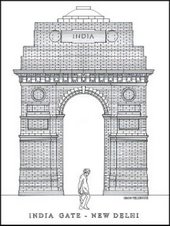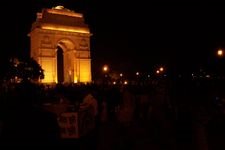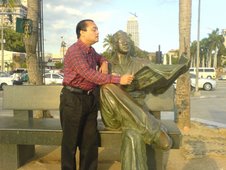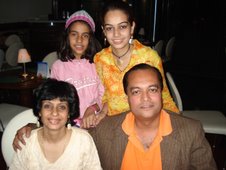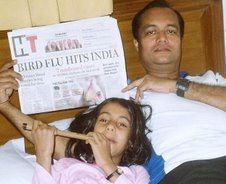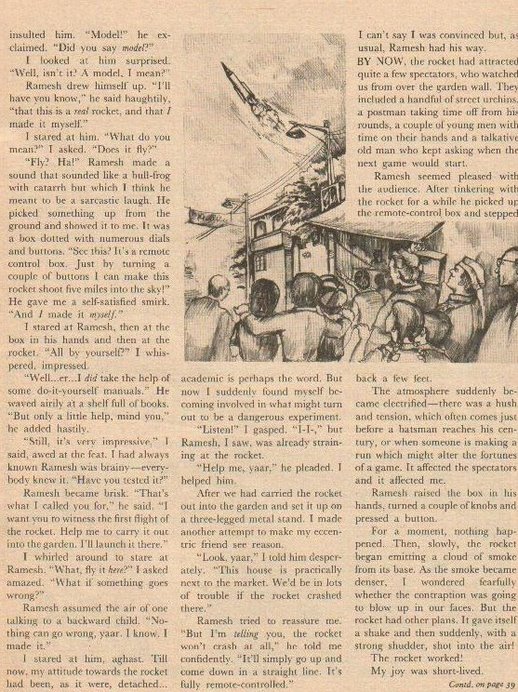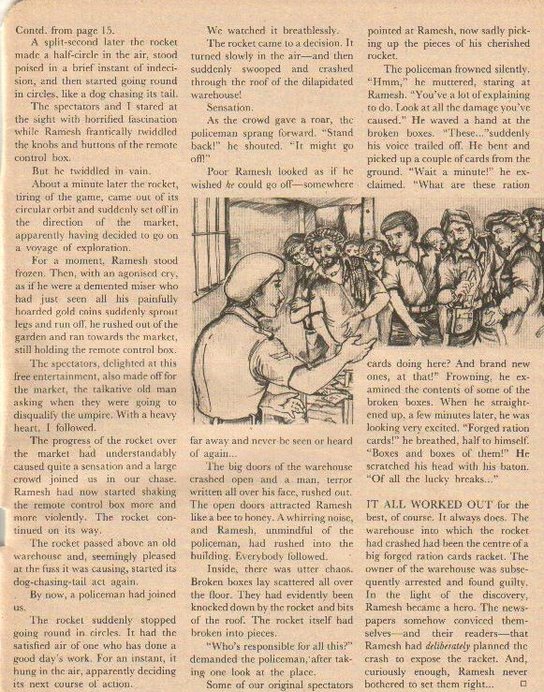
Friday, April 8, 2011
Saturday, March 26, 2011
MY SEVEN BOOKS (SO FAR) ...

Thursday, March 24, 2011
Saturday, March 19, 2011
Saturday, February 26, 2011
Thursday, February 10, 2011
Sunday, February 6, 2011
Friday, January 28, 2011
Sunday, January 16, 2011
Friday, January 14, 2011
Wednesday, January 12, 2011

http://www.a1books.co.in/searchdetail.do?a1Code=booksgoogle&itemCode=8122311458
Friday, December 24, 2010
An excerpt from my novel: "The Inheritance"
Built to accommodate one thousand and seventy four prisoners, the Arthur Road Jail currently housed three thousand and forty five inmates. The cell – more like a dormitory – in which Akshay Joshi was lodged had one hundred and eighty undertrial prisoners crammed into it – it had been designed to house just fifty.
Akshay Joshi had spent his nights in the jail trying to sleep in awkward positions, without much success. He already had enough accumulated sleep in his muddled up his brain to last several lifetimes. He looked forward to the illusion of space the morning release into the courtyard gave him.
Akshay Joshi was a mere shadow of the man he had been until a few days ago. Prison had been a revelation. The world here was as far removed from the life of glamour and luxury that he had been accustomed to as desert sands were from mountain glaciers. Apart from the heat and dirt and crowd and cramped spaces, it was the lack of privacy that was killing. Also demeaning and disgusting was the very close company of some of the worst dregs and scum of society – for whom the film actor Akshay Joshi was an object of curiosity, pity, mirth and ridicule. Akshay looked forward to the day his expensive lawyers would get him bailed out from this hell hole.
That day was not far away, he had been promised by his legal team.
Now, as Akshay was led by the guard to the courtyard adjacent to the jail barracks that housed his cell for his thirty minutes exercise opportunity, this bright and sunny morning in Mumbai, he prayed that he would soon be able to breathe the fresh air of freedom. As soon as he was out of this hell called Arthur Road Jail he would be able to focus his energies and resources on extricating himself from the attempt to murder charge that had been slapped on him. He would buy his freedom with all the money he had, if it came to that – but he would not return to this cesspool.
And he would use all the resources available to Satinder Singh also to get out of this mess – his lover Satinder would help Akshay stay out of jail. That was the least he could do. Otherwise, thought Akshay grimly, he would make sure that he dragged Satinder down with him…
The first thing that struck Akshay Joshi as he entered the small exercise courtyard and heard the clang of the gate being locked behind him by the jail guard, was that it was unusually empty. Normally, about one hundred jail inmates were released into this courtyard every morning, to walk around and stretch their limbs and steal a smoke from the cigarettes that had been surreptitiously smuggled into the prison premises by enterprising friends and associates of some of the prisoners.
Today there was nobody in the courtyard. Not a single soul.
Akshay wheeled around to stare at the gate through which he had entered the courtyard. It had been firmly locked by the guard who had escorted Akshay from his prison cell. The guard was nowhere in sight.
A cold hand clutched at Akshay Joshi’s heart.
His head spinning, Akshay began stumbling around the courtyard, not quite sure why. He just needed to be in motion – he did not want his brain to register the forebodings that were quickly pushing themselves into it, numbing his mind with dread.
The forebodings were not misplaced.
Seemingly out of nowhere four men appeared. Akshay knew two of them. One had been arrested for the rape and murder of two prostitutes in the slums of Dharavi. Another of the men had, it was alleged, wiped out a family of five, including three children, with an axe, in an act of vengeance for some past slight, real or imagined.
The other two men looked equally menacing. Their faces were impassive as they slowly approached Akshay.
The truth hit him with the force of a truck travelling at a hundred miles an hour. These men – and the guards – in fact the whole messed up prison establishment, had been paid off to eliminate him…
Akshay turned and ran from the four men with death imprinted on their faces. He ran round and round the courtyard in a blind frenzy of motion and action until he collapsed in a heap on the ground – already half dead from sheer exhaustion and gut wrenching fear.
The four men stood in a tight circle around him. Then one of the men raised his booted leg and kicked Akshay Joshi violently in the head. Another boot smashed into his groin. Then another boot smashed into Akshay’s writhing body. And another.
Akshay Joshi spent his last three minutes on this earth facing unremitting and cascading violence that ripped him apart from inside. He died in unimaginable pain.
Sunday, December 19, 2010
An Excerpt From My Book: "A Matter Of Survival"
I am an Olive Ridely Sea Turtle. I get my name from the olive (or green/grey) colour of my heart-shaped shell. I am also called the Pacific Ridely.
I am one of the smallest of sea turtles inhabiting the world’s oceans. I am only about two feet long and weigh just over thirty-five kilograms. The males of my species never weigh more than thirty three kilograms. I have come to the coastal waters bordering this beach called Gahirmatha, located on the eastern coast of the country called India, to nest.
Along with hundreds to thousands of my sisters, I nest two times a year on this beach and deposit between 100 and 110 eggs per nest. Hatchlings emerge from the eggs after fifty or sixty days of incubation in the nest.
After the eggs hatch, the little turtles, my children, along with many thousands of other hatchlings, will travel across the beach to the water – their new home.
Many will not make the short distance from the nest to the sea. They will fall prey to predators like vultures from the sky or jackals and snakes on the ground. But those who cross this most important challenge so early in their lives will, like me, go on to inhabit the waters of the open ocean and the wonderful world just beneath the surface of the undulating waves.
I have travelled many thousands of miles, thru’ choppy seas and dangerous waters, to get here. I do not have many enemies in the ocean – but sharks and killer whales do attack if they are hungry and a sea turtle is the only meal ticket in sight. My sisters and I migrate like this all together, in very large numbers, about twice a year. Once nesting is over, we go back from the beaches and shallow waters to the open ocean – our home.
I live in the middle of the ocean, inhabiting the upper, sunlit regions, where most ocean organisms live. Food is abundant there – lower down, in the unlit zones, water pressure is high, temperatures are cold, and food sources scarce.
I am not vey particular about what I eat: my diet includes crabs, shrimp, rock lobsters, jellyfish and tunicates. If nothing else is available, then even algae works for me. All this is abundantly available in the open ocean, in the upper, sunlit regions, where I live most of the year, except during the nesting season. Then I need to forage in coastal waters and estuaries.
The most remarkable characteristic of my species is our nesting strategy. Hundreds to thousands of us females converge in coastal waters then come ashore simultaneously in a spectacular mass-nesting event known as an “arribada” (this is a Spanish word meaning “arrival by sea”). Human scientists also term this behavior of ours as “synchronized nesting in mass numbers”.
During our massive nesting aggregations, known as arribadas or arribazones, many thousands of us female Olive Ridely Sea Turtles nest in large simultaneous waves over small stretches of beach.
We generally begin to aggregate near nesting beaches approximately two months before nesting season.
How do I know that the time is right for the arribada? Human scientists have conducted research in order to find the answer to this question and have offered several theories.
One theory suggests that we female turtles release a hormonal scent or pheromone that queues the beginning of the event. There is also evidence that these mass-nesting events coincide with certain phases of the lunar cycle. I really do not know. There is this instinct, passed down thru’ the generations, over a period of a million years, that tells my sisters and me – all of us around the same moment (give or take a few days or weeks) – when the time has come to begin our migration to the coast. For humans, this continues to be one of nature’s great mysteries.
The majority of us Olive Ridelys who live in the Indian Ocean nest in two or three large aggregations near Gahirmatha which is located in the Bhitarkanika Widlife Sanctuary of the province of Orissa in the country called India. I am told that this is one of the largest Olive Ridely nesting populations in the world, with about 400,000 of us sisters nesting every year. However, our numbers have come down very much. Legend has it that, not more than twenty years ago, 600,000 turtles, the mothers of our mothers, nested along the coast of Orissa, from Paradip to Chilika, in one week.
Since then, our numbers have reduced. We are suffering high mortality for various reasons. Many hundreds of my sisters have met their deaths due to near shore gill nets and trawl fisheries.
Humans are our biggest enemies. They hunger for our eggs. When given an opportunity, they slaughter my nesting sisters on the beach. They try to catch us at sea, with these huge nets, for commercial sale of both our meat and hides.
We Olive Ridely turtles are widely distributed across the globe in tropical and sub-tropical oceans of the world – but our largest nesting aggregations occur in the beaches of Orissa in the Indian Ocean. Nesting occurs elsewhere along the Coromandel Coast and Sri Lanka, but in scattered locations.
In the Pacific Ocean, arribadas occur only within the tropical eastern Pacific, in Central America and Mexico. In Costa Rico, arribadas occur at Nancite and Ostional beaches. There are two active arribadas in Nicaragua; Chacocente and La Flor; and a small nesting ground in Pacific Panama. My sisters tell me that there were several arribadas in Mexico, yet only one remains at Playa Escobilla in Oaxaca.
The primary threat to my species comes from human predation in the nesting habitat. The arribada with its large congregation of nesting females makes it possible for humans to collect huge quantities of eggs and kill or collect (to sell in the market) hundreds or even thousands of us turtles in one night. This practice of mass harvesting and killing over the past sixty years has caused local populations of Olive Ridelys to plummet in many areas of the globe.
I believe that the total population of my species worldwide has fallen by an astounding fifty percent during the last fifty years.
I believe that humans have labeled my species as endangered.
Another form of human intrusion that threatens us sea turtles is the permanent destruction of the nesting habitat through coastal degradation and so-called ‘development’.
‘Development’ like the huge factory complex and port that are being built near our favourite beaches in Orissa.
‘Development’ like the dredging and excavation activity that will be carried out on vast tracts of seabed near our favourite beaches to enable this port to be built. The digging up of the seabed for creation of the port will also destroy parts of the beaches we love to nest in and will disturb what human scientists call “aquatic ecosystems” – and what I know as sources of food and of life itself.
Where will we go to nest now?
Friday, October 22, 2010
Friday, October 15, 2010
My second novel: "The Inheritance" has been published...

Saturday, October 9, 2010
"Deceivers" can be purchased in a downloadable (Kindle edition) version...
http://www.amazon.com/DECEIVERS-ebook/dp/B0042ET47K/ref=sr_1_66?ie=UTF8&m=AH9CGK6QR37LL&s=digital-text&qid=1284464166&sr=1-66
Saturday, September 18, 2010
Book: "Deceivers" by Joygopal Podder (http://en.wikipedia.org/wiki/Book:%22Deceivers%22_by_Joygopal_Podder)
The synopsis of the short novel: "A Matter of Survival" is as follows:
On May 17th, 2010, India successfully test fires the indigenously developed Agni ll nuclear missile from the country’s main missile testing facility located on the east coast. This missile will greatly strengthen India’s land-based nuclear deterrent capability. This prompts China and Pakistan to accelerate their efforts to establish a clandestine base for monitoring India’s missile test facility on the east coast.
A leading industrial conglomerate of India has taken a concession from the government of Orissa to build and operate a factory and port project in the east coast of India – a project that will be state-of-the art and will contribute to the economic prosperity of India by optimum exploitation of the rich mineral resources of the region.
A NGO that works for conservation, begins a campaign against the port project and the corporate house that will implement it, claiming that the project will disturb the coastal ecosystem and also the million year old nesting beaches of an endangered species of sea turtle. The campaign raises the issue of improper examination of the environmental implications of the port project before the project was commissioned.
The campaign to save the sea turtle nesting beaches gains momentum and adversely impacts the share prices of the corporate group. This attracts a rival group, whose chairman has a longstanding professional and personal rivalry with the patriarch of the first group, to mount a hostile takeover bid.
There is a counter takeover bid in response. The stockmarket becomes a battlefield.
The forces inimical to the interests of India try to take advantage of this battle between the two biggest Indian industrial houses to try and take over ownership of both with help from disloyal insiders. This will also give these forces, China and Pakistan, ownership of the port project located near the missile test facility and also help undermine the economic base of India.
Caught up in this major power struggle are the CEO of the NGO fighting for the sea turtles and his former lover who is also the illegitimate daughter of the patriarch of the leading corporate house behind the port project as well as her brother, whose own NGO is threatened by the same corporate group his father heads. Past conflicts intrude into present day challenges to complicate and then resolve matters.
The synopsis of the short novel: "Last Deception" is as follows:
“Last Deception” is a thriller set in the background of the social sector in India. The lead character is a senior NGO professional.
The Story / Plot of “Last Deception”:
The lead character witnesses deaths due to water contamination while on a project field visit to an outreach programme and, after investigation, discovers that the lead donor of his NGO is the owner of the offending factory. He decides to expose the crime – and loses his job as a consequence of this action.
He then finds himself pursued by the promoters of another NGO, which proposes to address the problem of malnourishment in Madhya Pradesh, to join as CEO. He also survives a couple of attempts on his life. The promoters of the new NGO offer protection from potential enemies, which could include the industrialist he has exposed. This raises suspicions about the new NGO’s intentions in the lead character’s mind.
In the meantime, the lead character realizes that an Arab woman regularly attends his lecture classes all over the world. Spotting this woman with the man he suspects is trying to kill him makes him suspect her involvement also. This leads to a confrontation – in the process of which he learns that she is a CIA agent pursuing leads regarding Islamic terrorist jihadi fund transfers to the naxalites operating in India.
Her investigations have led her to one of the promoters of the new NGO which is head hunting the lead character. The area of operations of this NGO is right in the middle of naxalite territory. It appears that the lead character is being actively sought after to take over as CEO so that his recently acquired reputation as a crusader provides a cover for the new NGO’s real activites – funding of naxalites.
The lead character decides to take on the promoters of this new NGO head on by joining them and exposing the anti-national activities from within while working in the organization as the CEO.
He starts working with the CIA agent and her counterpart in Indian Intelligence to uncover proof of active involvement of the promoters of his NGO in using the NGO as a conduit for fund transfers from Islamic terrorist jihadi outfits world wide to naxalite groups operating in Madhya Pradesh.
The lead character also organizes food distribution programmes by his NGO to the marginalized tribals in the naxalite affected areas. During this work, he discovers evidence of brutality meted out by the insurgents on the local population – in an effort to instill fear and cooperation with their nefarious activities.
Further investigations not only reveal actual proof of the suspected fund transfers but also the fact the industrialist the lead character had earlier exposed – and whose Madhya Pradesh operations were being targeted by naxalites as being “anti-people” – was, in fact, conniving with the promoters of the new NGO and other leading industrialists and politicians (including a couple of Union Cabinet Ministers) to de-stabilise the Central Governments thru’ undemocratic means, since they were against the rapid pace of economic reforms and opening up of the Indian markets to foreign players.
The targeting of this industrialist’s Madhya Pradesh operations by the naxalites was an apparent ploy to portray him as a symbol of resistance to – and victim of – the naxalite movement.
The objective – to get the Prime Minister of India to visit the trouble spot and inaugurate the new factory of this industrialist in the territory of the naxalites, to prove a point that the State would not be cowed down by such insurgent movements.
The conspiracy – to use the opportunity of the PM’s visit to assassinate him and other dignitaries and create an explosive and unstable political scenario, thus enabling the conspirator Cabinet Ministers to take over the Central Government.
How the lead character unravels this conspiracy and traces and then discovers arms, ammunition and explosives hidden away in the godowns of the NGO where the food distribution programme items are stored – and how he prevents the crime and organizes capture of the criminals, constitutes the rest of the story.
Wednesday, September 8, 2010
Saturday, September 4, 2010
http://www.pustakmahal.com/book/book/bid,,9553A/isbn:9788122311457/index.html
Thursday, August 19, 2010
Saturday, August 14, 2010
Friday, August 13, 2010
Tuesday, May 4, 2010
I have just returned from a week's stay in Alpbach
Wednesday, April 14, 2010
Panvi At President House
Saturday, October 17, 2009
Sunday, May 24, 2009
Mummy is now fine...
Priti was undergoing dialysis at the same time in another room on the same floor. Paro, Eugene, Panvi, Piya and I were camping in the common lounge on the same floor as the operation theatre and the dialysis room.
Doctors kept calling me to sign consent for additional procedures. In retrospect it is good that all the problems were discovered and resolved in one shot - but at that moment, it was a bit scary.
Mummy returned home on my birthday, May 19, and gave me a birthday cake...which I cut in her presence (Piya clicked the cake cutting photograph; so she cannot be seen).
The birthday celebrations, that night, were additionally joyful!



Friday, May 8, 2009
Clouds
clouds move in clusters
There are days when the
clouds move alone
There a days when the
clouds follow the lightening
There are days when the
clouds precede the storm...
Clouds do not themselves
define the darkness
But clouds can clear the way
to a new dawn...
Thursday, May 7, 2009
Charity...
I quickly look the other way
Very rarely do I fumble for a coin
And throwing it down, hurry quickly past
Ashamed of my own rashness...
Saturday, April 18, 2009
When monkeys go on a fast - a folk tale from Karnataka, India...
“Before we begin, I think we should keep the food with which we’ll break the fast ready,” counselled the old monkey chief.
The monkeys nodded their heads in agreement. The youngsters were sent in search of food. They returned with huge hands of delicious-looking bananas.
“I think each of us should keep our share of bananas with us before we begin our fast, so that we don’t spend time distributing them after we break our fast. You can imagine how hungry we all will be by then!” said the chief minister of the monkey tribe.
The monkeys liked the idea and they all immediately collected their share of the bananas.
“Why don’t we peel one banana and keep it ready to eat? ” said one of the youngsters.
“Yes, let’s do that,” shouted a fat monkey in agreement. Just looking at the bananas was making him hungry.
“All right,” said the monkey chief. “We shall peel the bananas but under no condition should we eat them.”
So the monkeys peeled their bananas and carefully kept them ready for eating in the evening.
“Can I keep the banana in my mouth? I promise not to eat it till evening. Please!” a little monkey asked his father.
“Why don’t we all put a banana in our mouth? That way we can chew it immediately when we break the fast,” said his father, who had agreed to go on the fast only because his wife had not given him a choice. “As long as we don’t eat it, it should be fine,” he added.
So, the monkeys put the bananas in their mouths. One by one they eyed each other uncomfortably as they began their fast — and as you can imagine, within no time at all, the bananas disappeared down their gullets. And that was the end of their fast!
Monday, April 13, 2009
Tuesday, March 17, 2009
Wednesday, March 11, 2009
Sunday, November 23, 2008
Ramesh and the Landlord’s Secret (Part l)
A poem about the Principal (not very flattering) can lead to trouble. With Ramesh around, solving one problem usually leads to another – and then the adventures start.
I looked around at the circle of eager faces crowding close to my desk in the small classroom, then glanced down at the sheet of paper in my hands, cleared my throat and began reciting:
“To Mr. Gupta, our Principal,
This poem I dedicate,
Whose two hundredth birthday
We’ll probably soon celebrate –”
“Two hundred years?” exclaimed Raghu, the class monitor, interrupting me unceremoniously. “I never thought he was that old!”
I slowly raised my eyes and stared frostily at this critic of my art. “There is, “I declared stonily, “something called ‘poetic license’ which allows a writer to exaggerate a little. Even an ignoramus like you would’ve realized this if you’d waited to hear the next four lines. Or perhaps,” I enquired politely, “you’d rather I did not read out my poem?”
“No, no!” protested Raghu hastily. “I’m sorry I interrupted! Please continue yaar!”
I hesitated a little then, with a shrug, resumed reading.
“While the above-mentioned age
One may easily refute,
That Guptaji is very ancient
Is a fact nobody will dispute!
Although he’s supposed to be
Our Indian History teacher,
On the subject of good behaviour,
He’s an equally good preacher.
His lectures on the latter
Are really such a bore,
But we dare not to tell him so,
For we fear that he’ll be sore.
When he’s angry he resembles
A bull that has seen red,
Or a lion that, for many days,
Has not been fed.
When Guptaji calls for you,
It’s best that you run;
He’s probably the most terrifying person
Since Attila the Hun!
When he --”
But my classmates were not destined to hear the rest of my poem. At this point Deepak, who had been posted at the door as a lookout, announced in a hoarse whisper that sounded more like a bull frog with a sore throat: “He’s coming!”
In less time than it takes to say ‘Watch out!’ everyone was at his place, studiously scanning a book or sharpening a pencil. My poem was quickly thrust between the pages of my exercise book, and I was busy trying to look busy filling ink into my pen. A step was heard outside the door – and a moment later Mr. Gupta, the Principal of our school, entered to take his History class.
With the smoothness and perfect timing that comes only from long practice, we all swept to our feet and chorused in harmony:
“Good morning, Sir!”
“Good morning, good morning,” murmured Mr. Gupta somewhat absently. He mounted the small raised platform in front of the blackboard on leaden feet. Something was worrying our Principal.
As I pointed out in my poem, Mr. Gupta is an elderly man. He is also spectacled, balding and plump. He looks rather like a Roman Emperor with something on his mind. He carefully polished his spectacles with his handkerchief, replaced them and looked owlishly at the class.
“I…er… have an important announcement to make,” he declared in the manner of a prophet of doom. “The new landlord has refused to renew the lease on this building,” he continued. “We will have to seek new premises. A letter is being sent to each of your parents informing them of this.” Mr. Gupta paused as if at a loss for words. It was clear that this news had come to him like a thump on the base of the skull with a sock full of wet sand.
I wasn’t surprised at his feelings. Mr. Gupta had nurtured this school right from its birth, thirty years ago. The Educational Trust which administered the school would find it very difficult, if not impossible, to find another suitable building in the town. Mr. Gupta was thus in danger of seeing his life’s work being demolished in front of his eyes!
I was not the only one who realized this. Mr. Gupta’s words were followed by a tense silence. It was broken by the Principal himself. “Anyway,” he continued quickly, “I will not be able to take this class today. I have to go and attend an urgent meeting of the governing body of the Trust. Just gve me your homework exercise books.”
As Raghu went quickly round the classroom, we handed our History exercise books to him. Without a word, Mr. Gupta accepted the pile of exercise books from Raghu and swept out of the room.
A buzz of excited conversation broke out. “Wow!” exclaimed Deepak, springing up from his chair and coming over to my desk. “Poor Guptaji! Does it mean the school will have to close down?”
“We’ll have to join some other school, then,” declared Deepak, “Which one? St. Thomas’?”
There was an immediate storm of protest. “Never!” shouted Shiv, the star of the school football team, from across the room. “St. Thomas’ School has been our football rival for years and years! I’d never go there!”
“What do you think?” I asked Ramesh, who had also left his desk and come over.
My spectacled friend stared down at me and there was an odd look in his eyes. “Listen, yaar,” he said quietly. “In which exercise book did you hide your poem on Mr. Gupta?”
“My poem?” I asked in a puzzled voice, for I had forgotten about it in the excitement following the Principal’s brief announcement. “Er….let’s see. Oh, yes! I hid it in my History exercise book. Why?”
Ramesh stepped back and pointed his forefinger at me in a dramatic gesture. “And which exercise book of yours did you just hand over to Guptaji?” he asked.
I had sometimes wondered how I would feel if a bomb ever exploded at my feet. I knew now. I shot out of my chair like a rocket. My mouth fell open and I goggled at Ramesh like a dead fish.
“What a mess!” gasped Raghu, aghast at my plight. “When the Princi reads that poem of yours, he’ll blow his top!”
I slumped back in my chair.
“But don’t worry,” reassured Ramesh. “There’s still a way out!”
As a strong swimmer hoots to the surface after a high dive, my soul rose suddenly from the depths to which it had descended. I raised my head and stared at Ramesh. “What do you mean?” I asked.
“Well,” said Ramesh, the familiar glint appearing in his spectacles. “You heard the Princi say that he has to attend an urgent meeting now. My guess is that he’ll dump the exercise books he’s just collected in his study and go straight to the staff room or the seminar room or wherever the meeting is being held. Since the Princi’s study is never locked, we can go now and hop in when nobody’s looking, remove your poem from your exercise book, and hop out again! But we’ll have to act fast – before the Princi returns to his study after the meeting is over!
For a moment, the boldness of this plan took my breath away. “What if the Princi catches us?” I exclaimed.
“Am I afraid of the Principal?” cried Ramesh, manfully. “Well, yes, I am!” he added, after a moment’s reflection. “But he won’t catch us if we’re careful! Come on, yaar, don’t be chicken! Think what’s at stake!”
That decided me. Ramesh’s plan did have some chances of success and that was more than enough reason to justify trying it out. Beggars, after all, cannot be choosers. It was of vital importance that Mr. Gupta should not read the poem.
“All right,” I agreed, fighting down my natural fear of Ramesh’s daring escapades. “Let’s go!”
The Principal’s study was on the ground floor and in one corner of the rambling building. It was with…well, not quite an uplifted heart… call it a heart lifted about halfway… that I followed Ramesh there. At a moment when everything had seemed lost and disaster stared me in the face, Ramesh had come up with a plan which, while undoubtedly risky, did carry with it a chance of success. And, the good friend that he was, he had automatically made my problem his own. At the same time, I was fully aware that Ramesh has the general outlook on life of a ticking bomb. In his company you always have the uneasy feeling that something is likely to go off at any moment with a pop.
We reached the small passage leading to Mr. Gupta’s study and found, that by the mercy of the fates, it was empty. “Well,” said Ramesh, “who’ll go in?”
I began to get cold feet. “Er…you’re kind of better at this sort of thing, aren’t you?”
Ramesh grinned at me. “You’ll never change, yaar! All right, I’ll go! You stay as a lookout. Incase anybody comes along, start talking loudly to warn me. I’ll keep as quiet as a mouse until that person goes away! Got it?” I nodded.
Ramesh hurried to the door of the study. He looked furtively around him like the hero of a C-grade spy movie. Then he quickly turned the door knob and stepped into the room, shutting the door after him.
The seconds ticked away with agonizing slowness. Then, just as I began to feel that things were going smoothly, I heard the sound of heavy footsteps approaching. I whirled around to see who this unwelcome intruder was – and then my heart jumped into my mouth and slammed against my teeth! For the person who had suddenly rounded the corner and come into view was none other than Mr. Gupta himself!
Mr. Gupta stopped in his tracks as soon as he saw me. A puzzled frown creased his brow. “What are you doing here?” he asked. “Do you want something?”
I swallowed painfully. If he ever got to know what I wanted…
Mr. Gupta took a step forward. “Well? Why don’t you say something? Hurry up!”
I took hold of myself. With a courage born out of desperation, I managed to stammer in a loud voice: “I…er…well…er…actually, sir, I…er…wanted to…er…ask a question in history!
Mr. Gupta was truly amazed. “You want to ask a question?” He gave a pleased smile. “Well, well, wonders will never cease! Certainly, my boy, ask your question! Ask ten questions, if you want!” He glanced at his wristwatch. “The Chairman of the governing body has telephoned to say that he’ll be half-an-hour late. So we can discuss your problem now in my study. Come!”
I felt as if I had been hit in the eye with a wet fish. I reeled. “In the study, sir? But…but…”
But Mr. Guota had already reached the study door. With my heart still in my mouth, I followed. Had Ramesh heard me talking to Mr. Gupta? And had he found a place to hide?
Mr. Gupta swung open the door. I stopped breathing.
Mr. Gupta stepped into the room. I shut my eyes.
“What’s the matter?” I heard Mr. Gupta shout impatiently. “Why aren’t you coming in?”
I stepped into Mr. Gupta’s study and stared wildly around me. Ramesh was nowhere in sight! Hope began to creep back into my heart, much like a puppy that shamefully and quietly returns to his master's house after an unauthorised morning in the forest.
Mr. Gupta sank into the chair behind his desk. “Now ask your question!” he ordered.
I stared at the Principal, my heart sinking. I felt as if I was facing a firing squad. “Uh…it’s about the first battle of Panipat, sir!” I said quickly, on my feet.
“What about it?”
I thought fast. “Er…did Akbar –- ”
“Akbar?”
“No, no! I meant Humayun!”
“Humayun?”
I began to perspire. The situation was fast becoming desperate. I tried one last shot in the dark. “Actually, it’s…it’s about Babur!”
“Well?”
“Er…did he -- ” and then I broke off suddenly, my eyes nearly shooting out of their sockets. The cupboard door behind Mr. Gupta’s head had opened slightly and I glimpsed Ramesh peering at me from inside!
“What’s the matter?” asked Mr. Gupta surprised. “What are you staring at?” He began to turn.
Ramesh quickly re-shut the cupboard door. “I wasn’t staring at anything, sir!” I cried desperately. “My-my mind just wandered!”
Mr. Gupta stopped turning his head. Instead, he directed a penetrating stare in my direction. “Your mind seems to be wandering a lot, this morning,” he said, his voice hardening a little. “Will you or will you not ask me your question?”
I gave up. I was unequal to the situation. “I-I’ve f-forgotten my question, sir!” I stammered.
There was the sort of silence which I believe cyclones drop into for a second or two before they break in fury.
“What did you say?” he asked in a dangerous voice.
“I-I’ve forgotten my question, sir!” I repeated miserably.
“Oh?” said Mr. Gupta. He got slowly to his feet. “Is this some sort of a joke?” he thundered. “You have the nerve, the audacity, the outrageous cheek to try to be funny with me! You think I have nothing to do but sit and listen to your babbling! You – what is this?” he asked testily to the peon who had suddenly appeared at the door of the study.
“Excuse me, sir, but the Chairman Saab has arrived,” replied the peon. “He’s in the staff room.”
Mr. Gupta sprang to his feet. “That was very quick of him!” he exclaimed. “The meeting can start now!” He turned to the peon. “Go and tell the Chairman that I am just coming!” he ordered.
“Ji Saab,” said the peon and left. Mr. Gupta turned to me. “I’ll deal with you later,” he said grimly. “Now go back to your class!”
Mr. Gupta picked up some papers from his desk and swept out of the room. I scuttled after him.
Raghu and Deepak had told the rest of the class my plight. Immediately on entering the room I was surrounded by eager classmates wanting to know the outcome of the mission. The ordeal I had just suffered left me feeling as if I had been run over by several motor-lorries and it was some time before I could collect my thoughts sufficiently to tell them what had happened. After I had finished, Raghu uttered a low whistle and exclaimed. “I wonder that your hair hasn’t turned white – after what you’ve been through! So you don’t know whether Ramesh finally managed to remove your poem from your exercise book after all?”
“No,” I replied. “But Ramesh should be back soon. Then we’ll know!”
I was wrong. Ramesh did not return. The break bell rang soon after, and during the interval I searched the entire school building and grounds for him like a madman. But not a sign of him did I find! Ramesh seemed to have disappeared from the face of the earth – leaving not a trace behind!
The rest of the day was spent watching some documentary films in the auditorium. I naturally found it difficult to concentrate on the screen. Thankfully, no one noticed that Ramesh was missing. I knew that he had plenty of chances to slip out of the Principal’s study after Mr. Gupta and I had left. Ramesh’s non-appearance was something I just couldn’t explain.
When the last bell rang, Ramesh had still not re-appeared. Sick at heart, I picked up Ramesh’s school-bag along with my own and prepared to leave for home.
I do not know how I managed to reach home without being run over – I was too worried to notice what was happening on the roads.
The first thing I did on returning home was to pick up the telephone receiver and dial Ramesh’s number. No, Ramesh’s mother informed me, Ramesh had not yet returned home from school. Was anything the matter?
“No,” I assured her in a hollow voice. “Nothing’s the matter.” Perplexed more or less sums up the state I was in when I sat down to lunch. My mother’s cooking turned to ashes in my mouth. Just as I was finishing, the telephone rang.
“It’s for you,” my mother told me, holding the receiver in her hand, “Ramesh calling.”
Ramesh? For the second time that day, I shot out of my chair like a rocket. I grabbed the receiver from my startled mother and barked into the mouthpiece: “Where are you speaking from?”
“Home,” replied the familiar voice at the other end of the line. “I just arrived. Have you got my schoolbag?”
“Yes, yes!” I exclaimed impatiently. “But what happened to you? Where did you disappear?”
“It’s a long story,” said Ramesh mysteriously. “Were you worried?”
I uttered a hacking laugh.
“Was I worried, you ask! Why, I searched every drawer and dustbin in the school looking for you!”
“Sorry about that,” murmured Ramesh soothingly. “I couldn’t help it. I’ll tell you all about what happened to me a little later. You know the old abandoned house belonging to the landlord, near the field behind the school? Well, meet me there in an hour. And bring your torch along!”
“But-but --”
“No buts, yaar. Please do as I say! And, I’ve got your poem!”
“My poem?” I had forgotten all about it while worrying over Ramesh’s disappearance! “Yes, of course! Thanks a ton! O.K. I’ll do as you say. But you’d better have a good reason for dragging me there!”
The click of a receiver being replaced was the answer I got.
Next time: What has the abandoned house got to do with Ramesh’s mysterious disappearance from school?
Ramesh and the Landlord’s Secret (Part ll)
The school Principal announces in his history class that the school may close down since the landlord won’t extend the lease. A very unflattering poem about the Principal is left in a history exercise book by mistake, and sent along to the Principal’s office inside the book. Ramesh plans a daring rescue, but while he’s in the Principal’s study the Principal returns. Ramesh simply disappears! He doesn’t return to class for the whole day. His friend gets very worried, but then receives a telephone call at home from Ramesh, asking him to come to a certain abandoned house. When his friend asks why, the call is cut off!
The abandoned house belonged to the same landlord who owned our school building – the one who’d refuse to renew the school’s lease. These two buildings and the house in which the landlord now lived had all been built many years ago by the present landlord’s late father. The last landlord had died only a few months back leaving everything to his son. A couple of year’s ago, the roof of this house had collapsed during a big storm, and the house had remained unoccupied ever since.
An hour after my telephone conversation with Ramesh, I reached the broken-down gateway leading to the roofless house. Seeing no sign of Ramesh, I started up the driveway that led to the house. Just as I was a few feet away from the building, one of the ground-floor windows suddenly swung open and Ramesh’s head popped out.
“Hi, yaar!” he cried cheerfully. “What’s the matter with you? Got asthma?”
A sharp grasp had escaped my lips. But I felt perfectly justified in gasping. A weaker boy would have screamed and fainted.
“What do you mean,” I declared hotly, “By behaving like a jack-in-the-box? For a moment, I thought you were the local ghost!”
“I’m sorry, I frightened you,” said Ramesh, looking far from sorry. “I was just checking to see whether things were just as I had left them an hour ago.”
“What are you talking about?” I asked, my curiosity getting the better of anger.
“Come and see,” invited Ramesh, looking as pleased as a baby with his first rattle.
I climbed through the open window and followed Ramesh as he led me through the dark interior of the house. We reached a staircase but instead of going up Ramesh led e down. The steps ended in front of a stout door which, I presumed, led to the cellars. Ramesh tugged at the door. It opened, squeaking and grating like something in a radio horror programme.
Ramesh put his hand in his pocket and took out a small torch. He switched it on. “Did you bring your torch, like I asked you to?” he asked me.
“Er…no,” I admitted. “I forgot.”
Ramesh made a noise like a buffalo taking its foot out of a swamp. I guessed he meant it to be an expression of disgust.
The light from Ramesh’s torch revealed that we were in a small room cluttered with trunks, crates and large bundles of papers. There was an open doorway in the far wall. Ramesh waved his hand at the contents of the room. “I checked up some of these crates,” he said. “All this is the result of the general cleaning up that took place in the landlord’s residence after his father died and left everything to him. There’s more in the next room.” He started towards the second doorway and I followed.
Just as we reached the doorway, Ramesh’s torch went out. “Oh, heck!” exclaimed Ramesh. “This is the second time it’s happened in fifteen minutes! Some spring must be loose inside!” He started shaking the torch violently.
I took a few steps forward.
“Don’t --,” began Ramesh but that was all I heard. The next instant, I stepped into thin air!
The ground seemed to vanish beneath my very feet! All of a sudden, I found myself falling. My mouth opened to scream but even before I could utter a sound my feet landed on something hard sending a jolt through my body and I crashed forward onto my face!
The fall, though it was all over in a split-second, left me in a world that jumped and swam before my eyes. My chest felt as though somebody had extracted my heart and replaced it with some kind of lively firework. For a few seconds, I lay there, flat on my face, stunned more by the shock than the impact of the fall, trying to get my breath back. Then: “Are-are you all right?” a hesitant voice asked from above.
I slowly turned over and stared up at Ramesh’s head which I saw outlined against a square opening a little above where I lay. “No,” I replied with conviction. “I am not!”
“I-I’m sorry, yaar!” pleaded Ramesh. “For a moment I forgot that you didn’t know!”
“Know what?” I asked testily, for I was very angry. “Isn’t it time you told me what’s going on?”
“Yes,” agreed Ramesh. He jumped down through the opening and helped me to my feet. Once standing, I saw that the opening was only a foot or so above my head. Ramesh pointed to the opening with his thumb. “You fell through the mouth of a trapdoor.”
“A trapdoor?”
“Yes. I-I left it open when I went to fetch you from upstairs. The lid’s rather heavy.”
“Hm! But how did you find it?”
“Let’s start walking, yaar! I’ll tell you as we go along!”
We began walking down the passage, Ramesh’s torch lighting the way. “A little later,” began Ramesh, “this passage will branch into two more passages one leading to the left and the other to the right, each at right angles to this one. In fact, you can even say that this passage opens out into another passage running perpendicular to it. The passage on the left leads to the cupboard I was hiding in!”
My mouth fell open. “The cupboard you were hiding in!”
“Yes. In the Principal’s study.”
“In the Principal’s study!”
Ramesh frowned irritably. “Don’t repeat everything like an echo in the Himalayan mountains!” he exclaimed, returning to his old self. “It’s like this: I found the pile of exercise books which Guptaji had taken from our class, and I’d just picked up yours when I heard you talking loudly to our Princi himself! I quickly took out the sheet on which you’d written your poem and nipped into the cupboard!”
I am always ready to give credit where credit is due. “That was quick thinking! I’d have probably fainted!”
“No doubt,” conceded Ramesh. “But you nearly gave the game away when I peered out of the cupboard and you goggled at me like a startled snail! I thought that Guptaji was about to open the cupboard door so I stepped back, tripped over something and fell against the back of the cupboard. I heard a small click and a portion of the wall slid open behind me!”
I stopped in my tracks. “Wow!”
“I felt like wowing myself then,” continued Ramesh. “Naturally, I just had to find out where the opening led to! I climbed down some steps which I found leading from the opening and then saw that I was in a passage. A little later, I came to another passage branching off to the right which I followed. This is that passage!”
I frowned thoughtfully. “So now you know of two entrances to this underground passageway.”
“That’s right!” agreed Ramesh. “One in the Princi’s study and the other in the cellar of the abandoned house.”
“That means that there must be, at least, a third opening! I said, making a brilliant deduction.
Ramesh seemed to blossom like new-born lotus. “Ah!” he exclaimed delightedly. “Now you’ve put your finger on the spot, hit the nail on the head, gone to the heart of the matter! It also struck me that there should be at least a third opening and I’ve been doing a bit of thinking about it. You know, of course, that the school building, the abandoned house and the landlord’s present residence were all built together by his late father years ago?”
I nodded. “And so what?”
“Well, the father probably decided to join all the three buildings by a secret passageway!”
I began to see light. “Then the third entrance must be in the landlord’s house!”
“Exactly!” Ramesh suddenly motioned me to a halt. I saw that we had reached the T-junction of our passage and one running perpendicular to it. Ramesh jerked his thumb to the left. “That’s the way to the Princi’s study!” he announced.
I pointed to the right. “And that leads to the landlord’s house?”
Ramesh shone his torch into the passage on the right. “That’s what we’re going to find out!”
I stared at my unpredictable friend. “What – what do you mean?”
“We’ve only guessed where that passage leads to. We don’t know for sure,” Ramesh pointed out. Besides, there may be other branches leading elsewhere! We were lucky to stumble on to this passage. It’ll be a crime to leave it unexplored!”
I began to protest. “But-but --” But Ramesh, I saw, had already started to walk down the right-hand passage. On his face was a keen, tense hunter’s look.
I quickly debated with myself. Could I let Ramesh go on alone? Of course I couldn’t! Ramesh had, after all, risked his life and limb to make sure that my poem did not fall into Mr. Gupta’s hands. It was my duty to stand at his side now, in anything he did. Besides, I was rather curious. A secret passage is, after all, a secret passage. I followed Ramesh.
We walked in silence for quite some time. Then, suddenly, Ramesh’s torch shone on a heap of rubble. Ramesh came to an abrupt halt and I was forced to do likewise.
At first, I thought that the passage had fallen in. But, on closer inspection, I discovered that the pile consisted of broken bricks, though painted the color of rock, whereas the passage actually was solid rock.
Ramesh inspected the pile. “Somebody had walled up the passage here!” he announced, and he continued unnecessarily: “The wall has now collapsed.” He began to carefully pick his way over the rubble. Sighing to myself, I prepared to climb over behind him.
Once safely over the pile of rubble, we continued to walk in silence with Ramesh leading the way. Then, all of a sudden, Ramesh switched off his torch and braked to a halt, making me collide with him.
“What the --,” I began.
“Shh!” whispered Ramesh, grabbing my arm. “Look!”
I looked. In the distance I could see a gleam of light!
Still holding my arm and without switching on his torch again, Ramesh started walking forward. Terrified at the thought of being left alone in the dark, I let Ramesh drag me along with him.
As we approached the gleam of light, it grew larger and larger and soon assumed a square shape. It became clear that we were seeing the light through the mouth of the passage.
Ramesh halted again. “The light’s too strong to be coming from a torch,” he whispered to me. “It must be coming from an electric light bulb.”
For some time, I had been feverishly considering the possibility that the source of light might be a ghost.
“Listen, Ramesh,” I whispered back. “Let’s not go any further. We may be trespassing.”
Ramesh seemed genuinely shocked. “After coming all this way, we can’t go back without seeing what’s going on!” he exclaimed in a tense whisper, as if he couldn’t believe his ears. “Don’t be funny, yaar!” And so saying, he set off again. The light seemed to attract him like steel to a magnet.
Muttering dark things under my breath, I followed my friend.
As we approached the mouth of the passage, we began to hear some curious sounds. Together with a murmur of voices, we heard a strange gurgling. There were other sounds, too – fizzing, popping and clinking. And yes, there were fumes. The fumes, which had begun to tickle our noses, by now were rather pungent and sweet-smelling -- a bit like the fumes given off by the acids which we heated in the chemistry laboratory at school.
When we were only a few feet away from the mouth of the passage, Ramesh halted and signalled me to do the same. Then, he pressed himself against one wall and began to edge quietly towards the mouth. I pressed myself against the other wall and also begn to edge ahead.
We reached the mouth of the passage together and peered out.
A startling sight met our eyes.
The passage opened out into a huge wall hewn out of the rock. On the far wall of the hall was another opening through which the passage continued. Immediately in front of us was a single row of drums stretching away on either side of us and arranged a few feet away from the wall. Beyond the drums were stacked, against both the right and left wall, crates and crates of bottles filled with a yellow-coloured liquid.
In the middle of the hall were five big cauldrons, beneath each of which was a small pit filled with glowing coals. On the ground beside each cauldron were a large number of big glass jars containing a clear, colourless liquid. Around each cauldron stood three or four men. Some of the men were holding jars in their hands and pouring out the colourless liquid into the cauldrons. The others were stirring the mixture in the cauldrons with big wooden spoons. Near the opening in the far wall, there was what looked like a small, make-shift laboratory. The whole hall was brilliantly lit by four or five powerful bulbs suspended from the ceiling.
As we looked, three men entered the hall from the other opening. The first of these, a short, thick-set, muscular individual wearing a kurta and trousers, seemed to carry an air of authority with him. As he approached the cauldrons, the men around them stepped back respectfully. The man in the kurta peered at the contents of all the cauldrons and then nodded his head in a satisfied manner. As I recognized him, my eyes widened. The man in the kurta was none other than the school’s landlord!
Next time: The boys have stumbled upon a dangerous secret. What is the landlord upto?

































